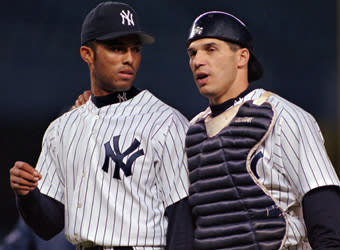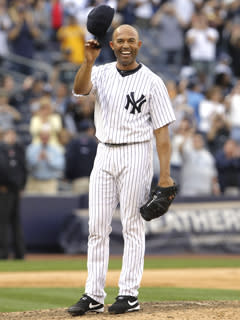Rivera's saves record comes with huge payoff
Mariano Rivera(notes) of the New York Yankees is the newly minted all-time saves leader – the epitome of diamond specialization – after retiring the side in order in the ninth inning Monday to preserve a 6-4 victory over the Minnesota Twins.
Fans at Yankee Stadium stood and cheered from his first pitch to his last, and Rivera retired Trevor Plouffe(notes), and Michael Cuddyer(notes), before getting Chris Parmelee to look at a cut fastball for strike three. The stadium roared and the placid Rivera calmly gave catcher Russell Martin a quick hug and a handshake.
And Rivera's reward for closing the deal 602 times goes beyond high fives and a like number of World Series rings.
We're talking money, money and Mo money.
Rivera, called "Mo" by his teammates, is easily the highest-paid pitcher in baseball history by several measures, the beneficiary of Yankees' largess and stability, his own consistency, and their mutual insatiable desire to win.
This is the fourth year in a row Rivera has been paid $15 million, the highest salary of any closer ever. Because he rarely pitches more than one inning in a game, he tops out at about 1,000 pitches in a season.
That's $15,000 per pitch.
Two pitches earn him as much as a Manhattan hotel doorman makes in a year; three pitches equal the pay of a teacher in Queens; four pitches are what a mixologist at The Plaza Hotel's Oak Bar pulls down; five pitches equals the yearly pay of an NYC fire battalion chief; six pitches net Rivera as much as a New York Philharmonic musician.
And so on.
Since breaking into the big leagues in 1995, the right-hander who grew up poor in a fishing village in Panama has been paid nearly a quarter-million dollars per save. He's made $120,000 per inning, $40,000 per out and $8,000 per pitch. No one else is even close in any of those categories.
Rivera is a deeply religious family man and, by all accounts, as solid a citizen as can be found in a baseball uniform. Some of the riches go to charity: The Mariano Rivera Foundation distributes more than $500,000 annually to help underprivileged children through church-based institutions in Panama and the U.S.
He has a lot of down time to contemplate ways to help the less fortunate. Rivera has pitched 1,209 regular-season innings, a total a top starter would reach in five seasons. Nearly half have ended with a save and most of them were as easy as the one that broke the record of 601 held by Trevor Hoffman(notes), who retired last season.
Rivera reacted like it was any other day. But moments later teammates convinced him to return to the mound to soak in the adulation of the crowd. Rivera smiled, doffed his cap and tried to hold back tears.
"This moment is great," he said. "I'm thanking God first, my wife, my kids, my parents and my teammates. … It's wonderful. We won and that's the important thing.
"I can tell you from back home in Panama to now, it's been a tremendous journey."
Pitching paydays
Mariano Rivera is the highest paid player per pitch in major league history. Related graphic: Saves leaders
Source: baseball-reference.com
The signature cut fastball Rivera throws more than 80 percent of the time might be baseball's best pitch, he walks fewer batters per nine innings than anyone else, and his WHIP and ERA are the lowest of any pitcher since 1920. His demeanor is unflappable and his decorum above reproach, yet 72 career blown saves prove Rivera isn't perfect.
He's just paid like it. By season's end Rivera will have made $144,530,125. That doesn't count postseason shares, which have totaled about another $3 million, including $1,880,239.10 from seven World Series. His record 42 postseason saves have come at the relative bargain price of about $115,000 per.
Rivera, who turns 42 in November, will make another $15 million next season, the last on his current contract. Despite dire warnings to the contrary seemingly every time he gives up a hit, he's been as effective as usual this season: His hits per inning is at career average; his strikeout-to-walk ratio is better; his ERA is better; and he's logged more than his current 43 saves only four times.
So barring injury, he'll likely throw another 1,000 or so pitches in 2012, keeping him at the $15,000 per pitch rate for another year. His career earnings will increase to $159,530,125, leaving him second behind retired starter Randy Johnson(notes) ($175,550,019) among pitchers on the all-time earnings list. He'll surpass Mike Mussina, Pedro Martinez(notes), Greg Maddux and Roger Clemens.
[Photo gallery: Mariano Rivera becomes baseball's all-time saves leader]
Because Johnson pitched 4,135 innings, his per inning pay of $42,455, per out pay of $14,152 and per pitch pay of $2,830 lags far behind Rivera. The closest to Mo in those categories is left-handed closer Billy Wagner(notes), who retired last season with 422 saves and $92,883,000. He was paid $6,857 per pitch.
The Yankees being the Yankees, five of Rivera's teammates are making as much or more than Rivera in 2011: third baseman Alex Rodriguez(notes) ($31 million) starter CC Sabathia(notes) ($23M), first baseman Mark Teixeira(notes) ($22.5M), starter A.J. Burnett(notes) ($16.5M) and shortstop Derek Jeter(notes) ($15M). But all have a much more intensive workload than the guy who trots in from the bullpen in the ninth inning.
Rivera reached this rarefied pay rate by uncharacteristically playing hardball with the Yankees after the 2007 season. The team refused to negotiate an extension during the season, and during a chaotic offseason that also included astronomical negotiations with Rodriguez, catcher Jorge Posada(notes) and starter Andy Pettitte(notes), Rivera squeezed every last dollar from the Steinbrenners.
While cleaning out his locker after the season, he said: "They had their opportunity, and they didn't do anything," and wouldn't acknowledge the Yankees were his first choice in free-agent bidding. A month later he mused that he could always follow manager Joe Torre to the Dodgers. But the Yankees bumped up their offer from $39 million to $45 million over three years and Rivera was back in the fold.
That deal established his late-career pay rate and it carried into his most recent contract, the two-year, $30 million deal that ends after the 2012 season. He's mused that he might become a minister after he retires, but would anyone be surprised if he put his impeccably neat signature on a one-year contract for another $15 million?
He'll talk to his wife, Clara, and their three sons. He'll ask himself if he still has the love for the game. He'll consider whether his cutter is still effective enough.
"It doesn't matter if I have 10 rings or 15 rings, I will want the 16th one, or the 11th one, or the sixth," he told the NY Daily News this spring. "You still have the passion or you don't have the passion. There's no in-between."
The man who succeeded Torre, Joe Girardi, has managed the Yankees the last four seasons and also was a Yankees catcher from 1996-99, giving him a unique perspective on Rivera. He has caught or managed luminary pitchers Maddux, Clemens, Mussina, Sabathia, Pettitte, David Cone and Dwight Gooden.
Who is the greatest pitcher Girardi ever caught? "I've got to say Mo."
And is Rivera the greatest he's managed? "Yeah."
"I got to know his personality when I caught him," Girardi said. "Nothing fazed him. There was no carryover effect. He does give you a comfortable feeling as a manager, like everything is under control."
[Related: Buy Mariano Rivera's pinstripe jersey]
And really, isn't that what a closer is supposed to do? Exude confidence, take the mound with an anthem playing – in Rivera's case, Metallica's "Enter Sandman" – then put the opposition to sleep.
It is somehow comforting that the all-time saves record for the foreseeable future belongs to the undisputed greatest closer ever. Maybe this peculiar little stat, late to the game (not to mention late in the game) – often worthless, just as often essential; often ho-hum, just as often razor's edge – means something after all.
"Mo is such an unbelievable force in our clubhouse," A-Rod said a few years ago. "In many ways, he's the voice for a lot of people. He means so much, more so than just what he does on the field. He's very special."
Fanfare was largely absent when Rivera reached the 600-save milestone Sept. 13. The specialization of the role diminishes it. Teams increasingly turn young relievers into closers rather than pay big dollars to proven free agents.
And it is a number without the point of reference of, say, 3,000 hits, 500 home runs or 300 wins. Besides Hoffman, no other closer has even 500 saves, so the achievement is noteworthy, speaking as many career milestones do to sustained excellence over a lengthy career. Six hundred is unlikely to be reached by any active closer.
It wasn't until the 1970s that managers began looking for pitchers who could be counted on to repeatedly get the last three to six outs in a game. Rollie Fingers was a trend-setter. Then came a wave of closers for whom 300 saves was the ultimate milestone: Bruce Sutter, Dan Quisenberry, Goose Gossage, Tom Henke and converted starter Dennis Eckersley among them. The next generation included Lee Smith and John Franco, who cracked the 400 barrier. Wagner finished with 422. The pay was so much less than Rivera's rate. Gossage, for example, earned $10 million in his career, making $372 per pitch. Yet he, along with Sutter, Eckersley and Fingers are in the Hall of Fame, as is knuckleball-tossing pioneer closer Hoyt Wilhelm.
Hoffman and Rivera are certain to follow.
Rivera was asked moments after notching save No. 602 whether this cemented him as the greatest closer of all time.
"I would never say that," he said. "All I can say is thank god for my teammates. I would never talk about myself. I consider myself a man blessed."
Other popular stories on Yahoo! Sports:
• The No. 1 person to blame for the Red Sox's collapse
• NFL's Week 2 winners and losers
• Why colleges' 'super conferences' aren't so super



